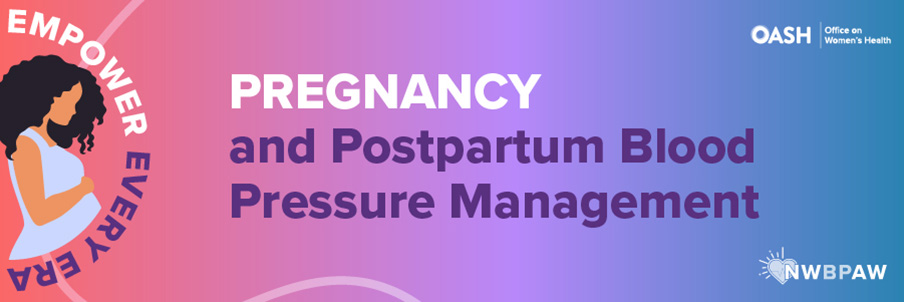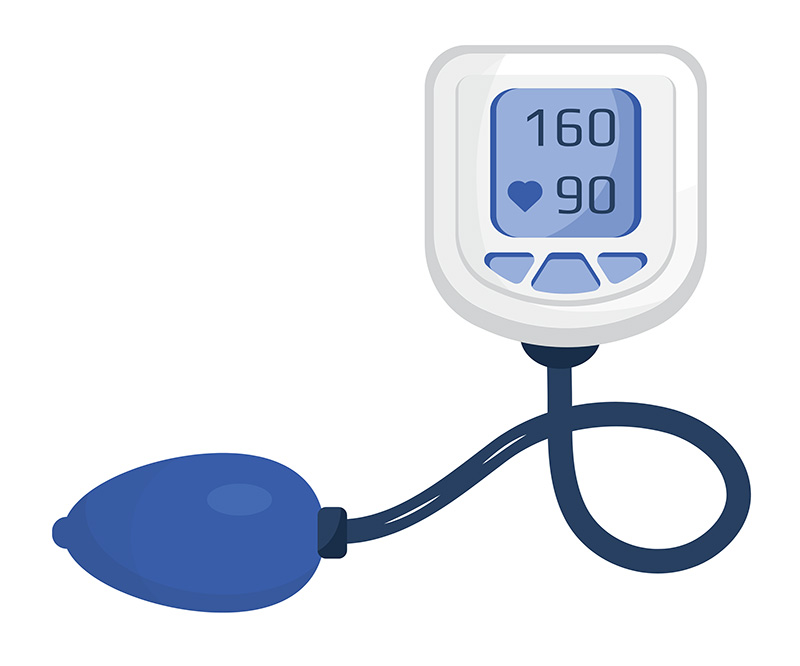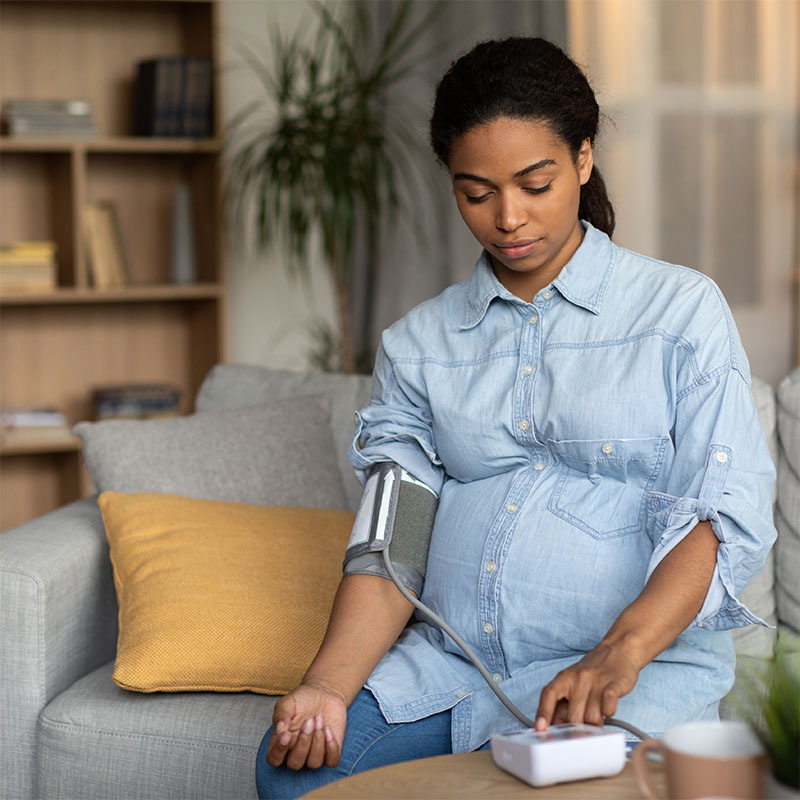
Blood pressure can change during and after pregnancy. Even if you don’t have high blood pressure (hypertension) now, you may develop it while you’re pregnant or after your baby is born. In fact, 2-6% of women ages 20-44 experience high blood pressure during pregnancy. Working with a health care provider to monitor and control your blood pressure during pregnancy and after birth is important for both your health and your baby’s health.
 Blood Pressure Numbers During Pregnancy
Blood Pressure Numbers During Pregnancy
During pregnancy, normal blood pressure is 120/80 millimeters of mercury (mm Hg) or lower. If blood pressure is 140/90 mm Hg or higher at two separate times after 20 weeks of pregnancy, it’s considered high. This is different from the range for non-pregnant women, for whom high blood pressure starts at 130/80 mm Hg.
Risk Factors for High Blood Pressure in Pregnancy
Anyone can develop high blood pressure, but some women have a higher risk than others. Certain factors can contribute to high blood pressure in pregnant women. For example, if you live in a rural area or are Black or Hispanic, you may have an increased risk for high blood pressure before and during pregnancy than other groups because of barriers in access to health-related resources. Other factors that can increase your risk for high blood pressure and complications from it during pregnancy include:
 Having diabetes or an autoimmune disorder
Having diabetes or an autoimmune disorder- Increased body weight or obesity
- Multiple gestations (being pregnant with more than one baby at once)
- Being over age 35
- Having more than 10 years between pregnancies
- Having had a previous pregnancy with high blood pressure or preeclampsia
- This being your first pregnancy
- Having chronic hypertension or kidney disease
- Having a history of blood clots
- Having used in vitro fertilization
- Having a family history of preeclampsia
Types of High Blood Pressure in Pregnancy
There are different types of high blood pressure you can experience during and after pregnancy.
- Chronic hypertension is high blood pressure that occurs before 20 weeks of pregnancy and may not show any symptoms. It occurs in women who had high blood pressure before becoming pregnant.
- Gestational hypertension is high blood pressure diagnosed after 20 weeks of pregnancy and may not show any other signs or symptoms of preeclampsia. It occurs in women who did not have high blood pressure before becoming pregnant. Gestational hypertension usually goes away after birth but can cause a higher risk of high blood pressure later in life.
Complications of High Blood Pressure in Pregnancy
Preeclampsia occurs when high blood pressure during pregnancy affects other organs in the body, such as the liver and kidneys, and can be life-threatening if untreated. It typically occurs after 20 weeks of pregnancy, often in the third trimester, but it can also be early-onset (diagnosed before 34 weeks of pregnancy) or postpartum (occurs in the weeks after childbirth). Identifying and managing high blood pressure during pregnancy can reduce the risk of preeclampsia. Symptoms can include:
- High blood pressure
- Swelling in the hands and face
- Severe headaches
- Changes in vision, such as blurriness or seeing spots
- Pain in the upper abdomen or shoulder
- Nausea or vomiting
- Sudden weight gain
- Difficulty breathing
 Contact a health care provider immediately if you experience any of these symptoms.
Contact a health care provider immediately if you experience any of these symptoms.
Eclampsia occurs when preeclampsia affects the brain, causing seizures or even a coma. Eclampsia can be life-threatening to the mother and the baby.
HELLP syndrome is a severe and life-threatening condition that occurs during pregnancy or shortly after birth. The symptoms are similar to those of preeclampsia and can cause high blood pressure, seizures, stroke, and liver issues if not treated.
A sudden spike in blood pressure (over 160/110 mm Hg) during pregnancy or after birth is a medical emergency that requires immediate attention from a health care provider.
Impacts of High Blood Pressure in Pregnancy
Short-Term Effects: High blood pressure during pregnancy can lead to complications for both the mother and the baby before or during birth that are dangerous or even life-threatening. It is associated with:
- Preeclampsia
- Induced labor
- Cesarean section
- Placental abruption
- Preterm birth
- Low birth weight
Long-Term Effects: If you had high blood pressure during pregnancy, you have a higher risk of further health issues after giving birth, even if your blood pressure returns to normal. You are more likely to experience:
- High blood pressure
- Heart disease
- Stroke
- Kidney problems
- Metabolic diseases such as diabetes
What to Do if You Have High Blood Pressure in Pregnancy
Before Pregnancy: If you are able,
- Talk to a health care provider: Discuss any health issues you have or medications you take, and say you are planning to become pregnant.
- Plan ahead: Make a plan to maintain your well-being and stay healthy during pregnancy.
During Pregnancy
- Check your blood pressure at home: This helps you keep track of any changes.
- Pay attention to your baby’s movements: Keep a count of how often you feel your baby kicking each day.
- Stay active: Talk to your doctor about the right level of physical activity for you.
- Take prescribed medications: Your health care provider can tell you which blood pressure medications are safe for you and your baby.
 See your health care provider regularly: More frequent visits can help monitor your health and your baby’s growth. Your health care provider may also do blood and urine tests to make sure your organs are working well and to prevent complications such as preeclampsia.
See your health care provider regularly: More frequent visits can help monitor your health and your baby’s growth. Your health care provider may also do blood and urine tests to make sure your organs are working well and to prevent complications such as preeclampsia.
After Pregnancy
- Be aware of postpartum issues: Pay attention to how you feel after giving birth, especially if you had high blood pressure during pregnancy, as it increases the risk of stroke and other complications.
- Know the warning signs: If you experience symptoms of preeclampsia after delivery, such as severe headaches, vision changes, or upper abdominal pain, contact your health care provider right away or call 911, as urgent medical care is needed.
Stories from Women with Lived Experience
Explore Susan’s Story: During her pregnancy, Susan developed high blood pressure and has been managing it ever since. In this video, Susan shares her journey and how she takes care of her health as well as provides words of encouragement for other women as they navigate their pregnancy and postpartum blood pressure journeys.
Discover Lindsay’s Story: “You know your body better than anyone else in the world.” Lindsay developed preeclampsia during her second pregnancy. In response to her symptoms, she was told that she was experiencing typical pregnancy swelling. But when her headache and blurred vision got worse, she checked her blood pressure at a pharmacy and discovered it was dangerously high. Lindsay went straight to the hospital, a decision that may have saved her life. Explore her story as part of the Centers for Disease Control and Prevention’s Hear Her campaign.
Resources to Learn More
- Hear Her Campaign — Centers for Disease Control and Prevention (CDC)
- Hypertension in Pregnancy Change Package — CDC’s Million Hearts®
- Pregnancy and Maternal Health — American Heart Association (AHA)
- Pregnancy and Your Heart Health Fact Sheet — NIH National Heart, Lung, and Blood Institute (NHLBI)
- Self-Measured Blood Pressure Monitoring for Hypertension Prevention and Control Video — Reproductive Health National Training Center

